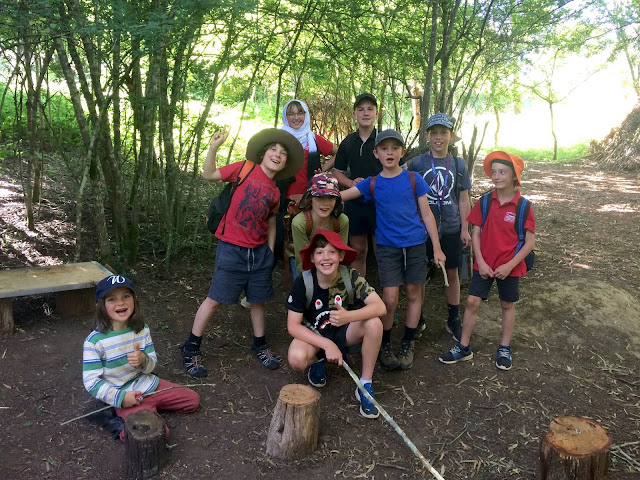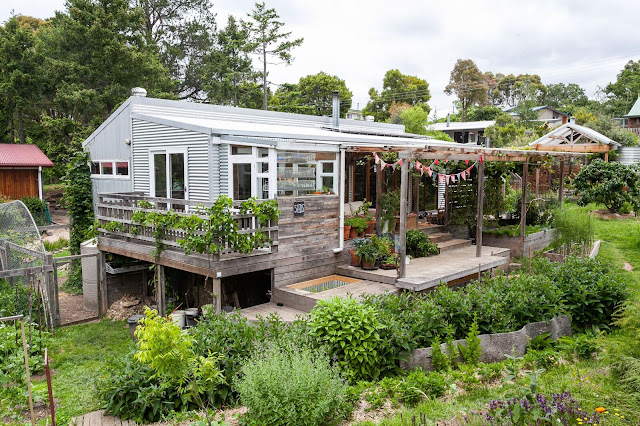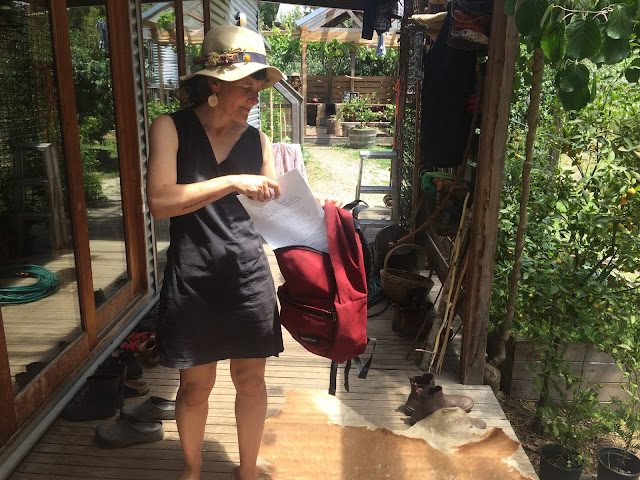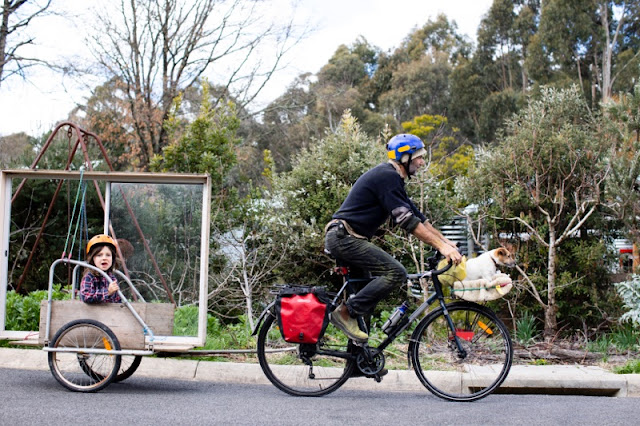 |
| Djaara women performing Yapenya, before the ceremonial fire is lit. |
Performing new ceremony is soulful, much needed work. Former SWAPs Connor and Marta – who met at Tree Elbow, got hitched, travelled far and wide and moved back to the area – are expecting a child. Patrick lit a fire for Connor and a number of men gathered in the forest to warm Connor into fatherhood with stories about being dads, sons and men. The night was transformative, a kind of medicine.
Meg concurrently held a women's circle for Marta and again the night revealed many insights and gentle sharings, and this group also realised ceremony was missing in their lives as women.
The cultural absence of gathering around fire, in forests and in other more-than-human environments, led us to establish Make & Play a few years ago. Patrick has recently begun a second weekly group for older kids called Feral & Free – a radical form of scouts (drawing on both the ecological masculinities and ecofeminisms of our day). The following quote from Patrick's book re:)Fermenting culture, which excavates the fire stealing creation myth of western culture, has been cited as the epigraph in the recently published, Ecological Masculinities: Theoretical Foundations and Practical Guidance:
A culture that has lost its beginning story is a culture adrift, destructive and self-harming. While the West can be seen as synonymous with imperialism, this is not our old people, this is not our true culture, gender-lopsidedness is not our only heritage.
 |
| Feral & Free crew |
The Celts reportedly said that a woman's soul is male and a man's soul is female. How's that for oldskool gender fluidity? The father fire (technics) and the matering earth (ecology) are within us together, regardless of how we identify. They are not opposing stories, they are intertwined. We are technical animals; storytellers. Story derives from fire.
Story features at all these gatherings in the forest. It is stories – what we tell out and to ourselves – that make us who we are. When we gather and speak together across a fire a raw heartfeltness springs forth. Courage to do this is more than required. Woody spoke his first public story recently, at the local community Cicada storytelling night. He mustered all his pluck to raise himself from his seat and make the slow walk up onto the podium at the Senior Citizens' Room behind the Daylesford Town Hall. His story was called Spring Blossom, and he quietly spoke of beholding the blossom of a wild apple, trying with his 6-year old language to conjure that earlier moment of praise and delight for the tree, for all of us to share.
 |
| Pic: Juanita Broderick |
Stories heard from across the crackling foci of the fire speak to our ancient selves in our present bodies. The podium or stage can adversely change this intent, but that's another story for another time.
Woody is growing up within a general household narrative where a commons (of any form) is never to be capitalised, where an economy (of any form) never enslaves us or makes ruin terra mater. On working out how he is to save up for a new guitar he said: "If I get the sticks from the tip to make my kindling bundles, then I'm not selling them from the floor of the forest but only selling waste." This ethic he did not learn at school but by learning to think with a forest's thoughts. What if the dominant value system shifted from unrestrained growth at all costs to the sanctity of humus and earth others at all costs? What transformations of culture would we see?
If we know that the tumorous Internet of Things is just the next sales pitch in a long line of greed and intransigence, how do we garner the courage to turn away from such seduction and face and embrace humus, and all the quiet things of earth not screaming for attention? How do we perform other stories that don't just passively go along with the dominant, egotistical ideology?
 |
| Pic: Laurel Freeland |
Woody has been setting up his fire-starting stall beside his dad's edible weed ID stand at the Daylesford Sunday Farmer's Market. Like the mushroom ID stand Patrick offers in autumn, spring is weed time, and there are many beneficial autonomous plants to eat, make medicine from, preserve and ferment. None of these gems beneath our feet require climate altering transportation, weeds move around without industrial distribution systems.
Weed knowledges are just some of the things we've been sharing on our Permaculture Living Courses (PLCs) this spring. Foraging for weeds is a powerful way back to sensing what ecological economies might be performed in the near future. Weeds constitute about 5% of our diet, but because of their many health-filled properties this constitutes about 40% of our preventative medicines.
On the third and final 2018 PLC we hosted Ryan, Lucille and Clare for two weeks, and reperforming commons of all forms was central to the curriculum. As was making leek kraut, another arsenal in our preventative medicine chest as it is both a pre- and probiotic.
Just three students at a time is small enough to engage intimately with the many interrelationships and layered learnings within a permacultural neopeasant household. We began the course with a big list to get through, that grew and grew from this picture on...
Wood was collected on bikes from areas of forest where fuel reduction burns take place. We talked about the importance of reducing fuel load going into the fire season while at the same time leaving more than enough for habitat, mycelium and humus production.
We also scavenged useful materials from the tip such as chicken wire and fire wood. (If you're reading this in your inbox you'll need to click through to our blog to watch the video below).
We gathered elderflowers for brewing tonics and ciders in ready for the festive solstice period.
We planted pumpkins at the community garden, yet another goodly place for reclaiming and expanding the commons.
We prepped beds (double dug and humanured) in the Tree Elbow annual garden. By the time a PLC participant leaves The School of Applied Neopeasantry they would have been introduced to the imperatives of origin-known food. They are also introduced to our economic form: subsistence first (nourishment of household), surplus second (gifts in and out to community), money third (paying the rent and bills). If money by its very nature must grow as an economic form, and knowing what this means to terra mater, it must be sent into degrowth. Money constitutes just 30% of our economy now. We are active degrowth-ers.
Each day of the PLC, when we broke for refreshments, we engaged in discussions on the philosophy, poetics and politics of neopeasant economy, permaculture garden-farming, or regenerative culture making (take your pick of language). Oh, and the subject of Zero was a high priority...
While philosophy, poetics and politics are important, they are nothing without a sleeves-rolled-up pragmatism and a goodly interspecies back scratch.
While Ryan, Lucille and Clare were with us we updated our fire plan, a three page document featuring various codes and scenarios, and what our actions will be with each. We're sure this doc will be put to use a number of times this season.
We carried out a dress rehearsal on the first Very High day in early December. The PLC participants will no doubt call on such prep work well into their climate changed futures.
Bush fires are, of course, going to be more and more frequent, and more or less a direct feedback to neoliberal economics. Thanks Jordan Peterson environmentalism! Thanks neoliberals everywhere! Thanks belligerent Baby Boomers and your mainstay Ayn Rand ideology! Go get 'em Hercules, Superman, indulgence tourism! Plugging and filling our gutters with water is really such a quaint response to the climate leviathan so indelibly ready to pounce. But plug we will.
As a car-free family, we (ironically) need to be even more prepared on fire risky days than those with cars. Which days we stay home and defend and which days we leave early (on the bus out of town after hopefully persuading the driver to let Zero and his PTV rail approved dog carrier on board because we are, pleadingly, climate refugees) will be critical to call. Packing special items and required documents to have on hand throughout the season is just one of the many tasks listed on our plan.
Ryan, Lucille and Clare carried out fire mitigating work on public land nearby to Tree Elbow. This labour also has the benefit of ensuring a weedy commons is not sprayed with pesticides, burnt or bulldozed by one of the various land managers, and thus the weed cycle returned to phase one, again. Using chop and drop techniques and an old peasant trick of laying down a sheet of iron or a large board onto the brambles, we reduce fire risk while using the crushed material to make more humus for other (fire retarding) plants to grow within.
We made this video to highlight holistic, post-pesticide methods of fire and weed mitigation, which is not the same as traditional Djarra land management practices, due to the fact the A1 soil horizon, and thus the ecology, has changed so radically. However, like both contemporary and traditional Aboriginal principles of land care, our methods aim to incorporate fire-risk mitigation with ecological enhancement. Watch on our Youtube channel or below.
Fire is something we handle every day. For us it is a local, renewable energy. Our outdoor kitchen stove (repurposed from the tip) to fuel our 8-slice toaster made up of a wire rack (again from the tip), powered by wood (also from the tip) collected on foot or by bicycle. No grid is necessary. Being of the mindset that nothing needs replacing, things just need repurposing, remaking or mending, we move our household's economy further into a degrowth of money and debt, growing an abundance of relationships with people, forests, soil communities, knowledges, nourishment and skills.
And when the day's labours are done, and the heat is upon us, we descend to the lake with our big post-carbon rig. Just about everything we need comes from the tip, skip bins, op-shops, garage sales or from terra mater herself. A blow-up dinghy is only ever a reclaimed waste product, lovingly patched. It never comes new off the shelf. When the tip runs out of such things, then we'll learn to make our own canoes from scratch. This is powerdown in action.
On the last night of the third PLC we invited the first 6 participants to join us. Nearly everyone was available. We walked with Liam, Cara, Ryan, Lucille, Clare, Moe and Marty up to the forest so each could see what the other had done in the commons to allay fire threat and continue the work of moving ecological succession into the next phase.
The PLC alumni came together for dinner and swapped notes and sang some sweet tunes. A tradition we'll keep going.
Marty and Cara, from The Rattlers, and the first PLC, gave a wee after dinner performance. (Again, you'll need to click through to our blog or Youtube channel to watch if you're reading this in your inbox).
Aren't they great! We're continually inspired by the love, labours and intent of young people on their respective regenerative culture making journeys.
Connor, Marta and Jeremy – the three Tree Elbow musketeers of 2017 – have all moved back to the area permanently, and are all brewing up special things of their own. Jeremy will be taking interns at his place in 2019, especially for those interested in learning all things curing animal skins, blacksmithing and other lost arts. Here he is with newcomer to town Tony, harvesting broad beans at the most recent community garden working bee.
Community garden working bees really get the love juices going. Through activities like gardening, the soil releases nonpathogenic Mycobacterium vaccae, which increases levels of serotonin and decreases levels of anxiety in mammals. Do it communally and you get oxytocin as a top up. Oxytocin is the bonding chemical found naturally in the body and exchanged between loved ones (including between dogs and humans). Though be aware, it also heightens awareness of enemies and potential threats. This smiling assassin will rake apart any mug who threatens terra mater.
And this mama, Lovely Duck, is also a fearsome warrioress when it comes to keeping her brood safe. It has been a pleasure to get to know her over the years. Her truly giving demeanour instructs us and lets us know what love is possible as radical homemakers.
There are many in our community who are actively engaging in a flow of gifts economy. These lil beauties were brought to us by Fiona and Edward from Adsum Farm. Kohlrabi kraut is the best! Knowing where the great majority of our food, medicine and energy comes from means we can better live accountably to our local land's logic and processes, and know what we need to give back to keep such abundance flowing.
Thank you Fiona and Edward for your generosity and nurture, and thank you Sari for your flame red morello cherries that you didn't want to see go to waste. They have lit our days; a wild morello cider is on the brew, and a bottle or two will boomerang back to you.
Fire is a wild force that could more than displace us and our community one day. Creation stories across the world speak of how humans tamed or procured fire as our first tool, and how we got burnt in the process. With climate change fire will be wilder and far less tameable. Djaara people haven't forgotten that Waa got burnt stealing the first tool and they are retelling that old story today. We would be wise to heed such a story.
Merry solstice everyone! May you continue to trust the fire in your bellies in 2019, and stoke your guts with goodly microbe-generating fibres and ferments from your homeplace hearths.
If you would like to come and visit our homeplace we have three more house + garden tours coming up in 2019: Sunday 24 February, Sunday 31 March and Sunday 28 April.
 |
| Pic: Jennifer Polixenni Brankin |
































































